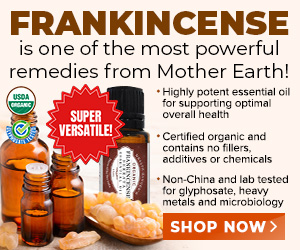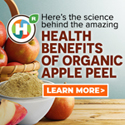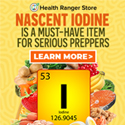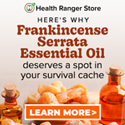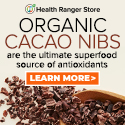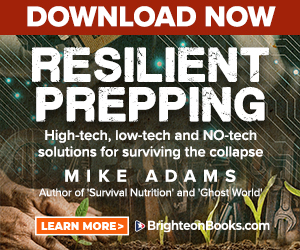
Top Six Reasons to Eat Only Organic Fruits and Vegetables
Monday, February 16, 2009 by: Heather Havey
Tags: organic food, health news, Natural News
- Aerosolized bioweapons? Strange “diploid biomasses” falling out of the sky in Florida captured under the microscope
- Possible biosignatures detected on Exoplanet K2-18b, raising hopes for alien life
- U.S. demands U.K. protect FREE SPEECH, repeal hate speech authoritarianism, in latest trade deal negotiations
- Russia escalates censorship war, targets over 200 VPN apps amid Google resistance
- Analysis: The coming economic collapse, a mass uprising and Trump's three secret weapons to halt the growing revolt
- HHS Secretary Kennedy will likely investigate the following environmental exposures as CAUSES OF AUTISM and brain damage in children
- TAKE IT DOWN Act advances in Congress amid free speech concerns
- Trump's bold trade overhaul reaches a crossroads with Italy, as "fair deals" promise sparks global attention
- Kiss Your Genetic Privacy Good-Bye! 23andMe Gets Green Light to Sell Your Intimate Genetic Details to Anyone They Want
- Israeli lobbyists boast of controlling US national security policy in leaked AIPAC audio
- Mike Adams releases country western hit single: Goin’ Back in Time is Comin’ Home
- Kava: The Pacific's healing wonder
- Scientists debate possibility of TIME TRAVEL, after Trump Admin says new technologies can "bend space and time"
- Maple syrup: Nature's golden superfood and its sweet health benefits
- Widespread social and economic unrest: Steve Quayle issues urgent financial warning of imminent asset collapse in new interview with Mike Adams
- M.W. Walbert’s “The Coming Battle” traces the evolution of money power in America
- Manufacturing surge under Trump sparks optimism amid concerns over economic strains
- Russia's migrant dilemma: Balancing security and human rights amid rising xenophobia
- Aerosolized bioweapons? Strange “diploid biomasses” falling out of the sky in Florida captured under the microscope
- Analysis: The coming economic collapse, a mass uprising and Trump's three secret weapons to halt the growing revolt
- Widespread social and economic unrest: Steve Quayle issues urgent financial warning of imminent asset collapse in new interview with Mike Adams
- TAKE IT DOWN Act advances in Congress amid free speech concerns
- Israeli lobbyists boast of controlling US national security policy in leaked AIPAC audio
- Kiss Your Genetic Privacy Good-Bye! 23andMe Gets Green Light to Sell Your Intimate Genetic Details to Anyone They Want
- Mike Adams releases country western hit single: Goin’ Back in Time is Comin’ Home
- U.S. lawmakers investigate Meta over alleged China collaboration
- CLOT SHOT PLANDEMIC UNFOLDING: Fibrous, rubbery clots caused by covid injections have prion-like seeding activity
- Fauci is back in the limelight, and he’s busy promoting a future COVID or FLU pandemic
- Defunding DEADLY mRNA jabs: Government funding for mRNA technology being scrutinized and sidelined until proven "safe and effective" for real
- Russia escalates censorship war, targets over 200 VPN apps amid Google resistance
- Curcumin’s ancient healing power supercharges muscle recovery, and its effects are compounded with anti-inflammatory foods and supplements
- I Want My Bailout Money – new song and music video released by Mike Adams
- I Want My Bailout Money – new song released by Mike Adams
- Government waste exposed: Hegseth supports Musk’s demand for accountability from federal workers
- U.S. approves new Russian ambassador as diplomatic thaw continues
- Federal employees whine over DOGE's new directive requiring them to do a 5-point summary of weekly accomplishments
- Newly released JFK files reveal Pentagon's role in creating Lyme disease and covid in the same lab
- Analysis: The coming economic collapse, a mass uprising and Trump's three secret weapons to halt the growing revolt
- Aerosolized bioweapons? Strange “diploid biomasses” falling out of the sky in Florida captured under the microscope
- Kiss Your Genetic Privacy Good-Bye! 23andMe Gets Green Light to Sell Your Intimate Genetic Details to Anyone They Want
- Mike Adams releases country western hit single: Goin’ Back in Time is Comin’ Home
- European Court of Justice: Healthcare professionals who promoted or administered COVID-19 vaccines are CRIMINALLY LIABLE for any harm caused
- Widespread social and economic unrest: Steve Quayle issues urgent financial warning of imminent asset collapse in new interview with Mike Adams
- Federal employees whine over DOGE's new directive requiring them to do a 5-point summary of weekly accomplishments
- U.S. approves new Russian ambassador as diplomatic thaw continues
- CLOT SHOT PLANDEMIC UNFOLDING: Fibrous, rubbery clots caused by covid injections have prion-like seeding activity
- Government waste exposed: Hegseth supports Musk’s demand for accountability from federal workers
- I Want My Bailout Money – new song and music video released by Mike Adams
- I Want My Bailout Money – new song released by Mike Adams
- Fauci is back in the limelight, and he’s busy promoting a future COVID or FLU pandemic
- Defunding DEADLY mRNA jabs: Government funding for mRNA technology being scrutinized and sidelined until proven "safe and effective" for real
- Trump administration poised to overhaul crypto regulations with new SEC leadership
- Now you can HEAR chemistry: Health Ranger translates molecules into music in stunning video demonstration that will blow your mind (and your ears)
- South Carolina Congressman proposes new $250 bill and wants Trump on the front
- Red Cross issues warning to stop blood plasma donations from vaccinated people
- Scientists confirm: GENIUS brain function can be spontaneously unleashed in humans without any apparent cause
- EPA advisor admits the agency is funneling billions to climate groups ahead of Trump’s return to White House
- HYSSOP: What research reveals about the health benefits of this ancient holy herb
- Two containers with completed ballots fall out of truck in Florida
- Newly released JFK files reveal Pentagon's role in creating Lyme disease and covid in the same lab
- Mike Adams releases country western hit single: Goin’ Back in Time is Comin’ Home
- Global leaders unite to clamp down on “misinformation” with UN-backed Cascais Declaration
- BREAKING: 2025 NDAA authorizes mandatory military draft of WOMEN across America… as Pentagon pursues global NUCLEAR war with both Russia and China at the same time
- I Want My Bailout Money – new song released by Mike Adams
- Michael Yon warns of a ZIONIST TAKEOVER in Trump’s second administration
- The Health Ranger releases “Vaccine Zombie” song and music video, using AI-animated zombies for the music video
- Ozempic and Wegovy weight loss drugs are injectable LIZARD VENOM PEPTIDES that may unleash a devastating wave of organ failure… side effects align with symptoms of SNAKE BITES
- BOMBSHELL: DNA testing kits are a SCAM to develop ethnic-specific bioweapons
- Israeli soldiers accused of even more torture and abuse in the West Bank
- These 13 countries just signed an agreement to engineer a global FAMINE by destroying food supply
- RFK Jr. clears key hurdle: Sen. Susan Collins backs controversial HHS nominee, signaling a new era for health policy
- NASA admits that climate change occurs because of changes in Earth’s solar orbit, and NOT because of SUVs and fossil fuels
1. You Are What You Eat
In 1826, Anthelme Brillat-Savarin originated the ever-famous "You are what you eat" in his book Meditations on Transcendent Gastronomy. We have heard this truism throughout our lives. Have you considered the depths of its wisdom? Eat an apple, and you eat life: vitamins, minerals, water, and more. Eat pesticide residue, and you fill your body with poisons [5, 6]. These toxins accumulate in your muscle and fat tissues. Some of them are nearly impossible to ever remove from your body. Mothers who breast-feed children illustrate an example of these danger potentials, because poisons are passed to the baby. The Journal for Pesticide Reform reports that "pesticides such as chlordane, heptachlor, DDT, DDE and other organohalogen compounds do not biodegrade in the environment. Instead they bioconcentrate and are stored in the fat of human beings, who feed at the top of the food chain." Also, a 1999 Consumers Union report determined that "pesticide residues found in foods children eat every day often exceed safe levels" [7].
Organic foods are grown with no poisons. They are natural foods that have been grown with more conscious care for the health of the soil, the plants, and the people who will eat them. Over 100 studies have found that the nutritional quality of organic foods far surpasses that of conventional produce [8-10]. Why take a chance and risk exposing yourself, your children, or your friends to chemicals that could destroy their health? Why make this even a negotiable point for yourself? Choose organic, choose natural, and you choose health.
2. Food is your best medicine.
In the 5th century BC, Hippocrates taught that "let food be your medicine and medicine be your food." He was highly respected during his lifetime, and he has been famous ever since. His words have stood the test of time and remain deep wisdoms that we can live by. All medical doctors to this day recite the Hippocratic Oath. In this vow, doctors promise to try never to harm their patient and also to work for their patient's highest good.
We can all make similar choices. We can all seek to bring about our highest good. We can all seek not to harm ourselves. We can live by that oath and also by Hippocrates' other famous teaching: Food is your Best Medicine. If this is true, then it makes sense that we should choose foods that are known to bring us health, energy, and peace of mind. Scientists have proven in many studies that organic food choices have far superior nutritional quality than conventional food choices [8-10]. Also, they have proven that foods grown with pesticides are definitely linked with diseases and deaths for humans and animals [11-13].
With all that in mind, the choice seems clear: Choose Organic.
3. Pay now or pay later.
Cost is the number one reason that people choose for not buying or eating organic foods. When you eat food that may contain poisons, however, the cost is far higher than simply the price tag. This cost also includes the impact that this food choice has upon your body and the world. Studies have proven that pesticides, herbicides, insecticides, and other poisons accumulate in the body and lead to illness, disease, and death [11-13].
Next time you feel hesitant to pay a couple of extra dollars for an organic item, simply remember: Pay now for delicious, healing food or pay later for medical bills, illness, and suffering. When you pay for organic food, you pay for energy, health, and the wellbeing of the Earth.
4. We prefer life over death.
Humans innately desire life. We desire health, energy, well-being, happiness, and wellness. Thus, we should choose that which will bring us greatest energy, happiness, and health. Conversely, we should not choose that which will bring us fatigue, depression or anxiety, ailments, illnesses, diseases, or death.
Pesticide is designed to kill, and it does not know when to stop killing. This is all that it does. Organic, naturally-prepared foods, on the other hand, provide beneficial nutritional and healing qualities for us.
With all this in mind, again, the choice seems clear: Choose Organic.
5. Earth needs your help.
We live amidst the newest mass extinction on our planet. Typically in a mass extinction, more than 50% of species on Earth die off, and over 70% diminish greatly [14]. A recent study published in Trends in Ecology and Evolution (TREE) states that "most species [on Earth] are declining as a result of human activities and...the result will be a more homogenized biosphere with lower diversity at regional and global scales" [14]. The study also reports that "humans have not yet fully impacted some remaining ecosystems (and their endemic species) so that the total number of declining species will probably grow." We are hurting animals and plants worldwide. We are also harming the quality of our air, our water, and our soil. The result of this is that we hurt ourselves, also. Every level of life is being affected by our lifestyle and our choices.
Every choice we make has an impact on environment. When we buy food (or anything), we support every level of production that has gone into this product. We support the farmer or rancher or logger who grew our primary resources. We support whatever pesticides or natural methods that they choose. We support also the manufacturing processes that produce our goods. This means that we also support any use of chemicals or packaging that manufacturers choose to use. At the next level, we also support the distribution of these foods or goods to our stores. We support the stores at which we purchase items. Finally, we support the gasoline, bicycle, and shoe companies that provide our means of reaching the store to buy food.
Every time we make a choice we have a large impact. We affect ourselves, multiple other people, resources, surrounding lands and animals, the carbon footprint (air, water, soil) of distribution and production, and the gasoline/automobile/bicycle companies that give us movement.
Your choices make a difference. The Earth needs your help. Therefore, choose organic.
6. Healthy plants mean healthier soil, water, birds, worms, animals, plants, air, and you.
Since the 5th century BC, people have been telling us a healthy way to live. The way is natural. The way is organic. The natural path honors nature and works in harmony with Earth. As a result, we achieve harmonious health. We feel energy, peace of mind, wellness, and health. Also, the plants and animals benefit. The air, water, and soil benefit. Organic food is a choice that makes a lot of sense. Again, you pay now or pay later. Make organic food a non-negotiable choice. Choose life.
Resources
1. "Colony Collapse Disorder Debunked: Pesticides Cause Bee Deaths." https://www.naturalnews.com/023679.html.
2. Pimentel, D. et al, "Environmental and Economic Costs of Pesticide Use," Bioscience Vol 42, No.10, November 1992.
3. Mary Deinlein, "When it Comes to Pesticides, Birds are Sitting Ducks," Smithsonian National Zoological Park. http://nationalzoo.si.edu/ConservationAndSci...
4. Williams, T., Silent Scourge, pp 28-35, Audubon, Jan-Feb 1997.
5. "Pesticide Residues in Urine of Adults Living in the United States: Reference Range Concentrations." Centers for Disease Control and Prevention. Environmental Research Volume 71, Issue 2, November 1995, Pages 99-10.
6. "Acute occupational pesticide-related illness in the US, 1998-1999: Surveillance findings from the SENSOR-pesticides program." American Journal of Industrial Medicine Volume 45, Issue 1, Dec 2003, Pages 14-23.
7. Consumers Union. 2000. Pesticides Residues Still Too High in Children's Foods. http://www.consumersunion.org/food/pdpdc600.....
8. "New Evidence Confirms the Nutritional Superiority of Plant-Based Organic Foods," State of Science Review, March 2008 [This is a 56-page downloadable review of many research studies that have been done in recent years regarding the nutritional quality of organic plant foods.] http://www.organic-center.org/science.nutri....
9. " Fruit Quality, Antioxidant Capacity, and Flavonoid Content of Organically and Conventionally Grown Blueberries." Journal for Agricultural and Food Chemistry Volume 56, Issue 14, 2008, Pages 5788-5794.
10. "Effects of agricultural practices on instrumental colour, mineral content, carotenoid composition, and sensory quality of mandarin orange juice." Journal of the Science of Food and Agriculture Volume 88, Number 10, 15 August 2008 , Pages 1731-1738(8).
11. Waldrum, Joseph D. and Pamela L Brady and J. Ples Spradley. 1996. Pesticide Residue in Food: The Safety Issue. AK: Southern Extension and Research Activity Information Exchange Group.
12. "Pesticide-related health problems and farmworkers." American Association of Occupational Health Nurses Journal Volume 37, Issue 3, March 1989, Pages 115-30.
13. The Organic Trade Association lists many excellent research study results that prove the nutritional superiority of organic foods. http://www.ota.com/organic/benefits/nutritio...
14. Michael L. McKinney & Julie L. Lockwood, "Biotic homogenization: a few winners replacing many losers in the next mass extinction" Trends in Ecology & Evolution Volume 14, Issue 11, 1 November 1999, Pages 450-453.
About the author
Heather Havey, M.A., is a naturalist, organic farmer, & holistic health practitioner. She is the author of many books, including Reflections for Radiant LivingHeather Havey invites you: love Earth, grow your own food, heal the soil, and plant trees. Make your yard a wildlife habitat and organic garden rather than a mower-dependent, chemically-maintained lawn. The world is enhanced by your care and beauty.
Organic food at FETCH.news
Get independent news alerts on natural cures, food lab tests, cannabis medicine, science, robotics, drones, privacy and more.
Take Action: Support Natural News by linking to this article from your website
Permalink to this article:
Embed article link: (copy HTML code below):
Reprinting this article:
Non-commercial use OK, cite NaturalNews.com with clickable link.
Follow Natural News on Facebook, Twitter, Google Plus, and Pinterest
Science News & Studies
Medicine News and Information
Food News & Studies
Health News & Studies
Herbs News & Information
Pollution News & Studies
Cancer News & Studies
Climate News & Studies
Survival News & Information
Gear News & Information
News covering technology, stocks, hackers, and more



"Big Tech and mainstream media are constantly trying to silence the independent voices that dare to bring you the truth about toxic food ingredients, dangerous medications and the failed, fraudulent science of the profit-driven medical establishment.
Email is one of the best ways to make sure you stay informed, without the censorship of the tech giants (Google, Apple, Facebook, Twitter, YouTube, etc.). Stay informed and you'll even likely learn information that may help save your own life."
–The Health Ranger, Mike Adams










